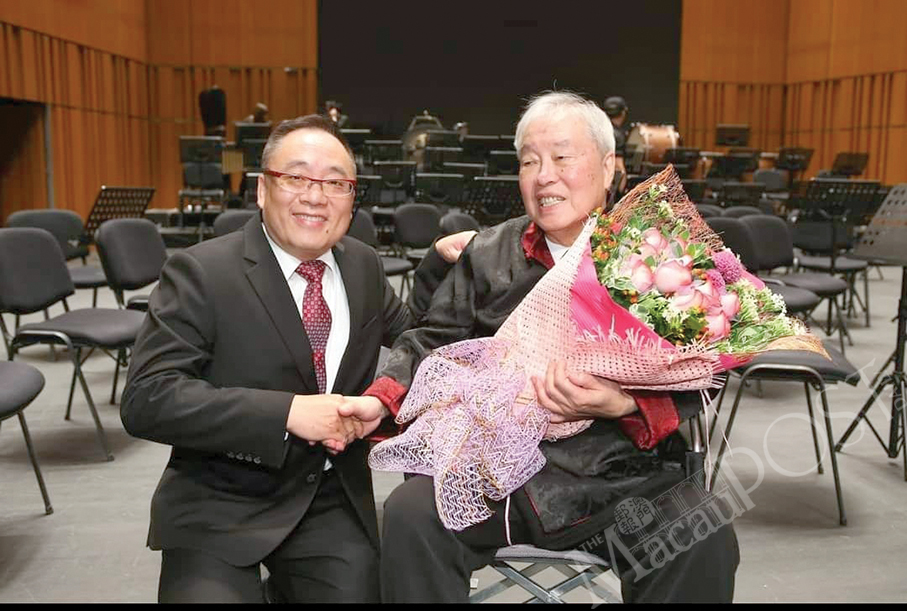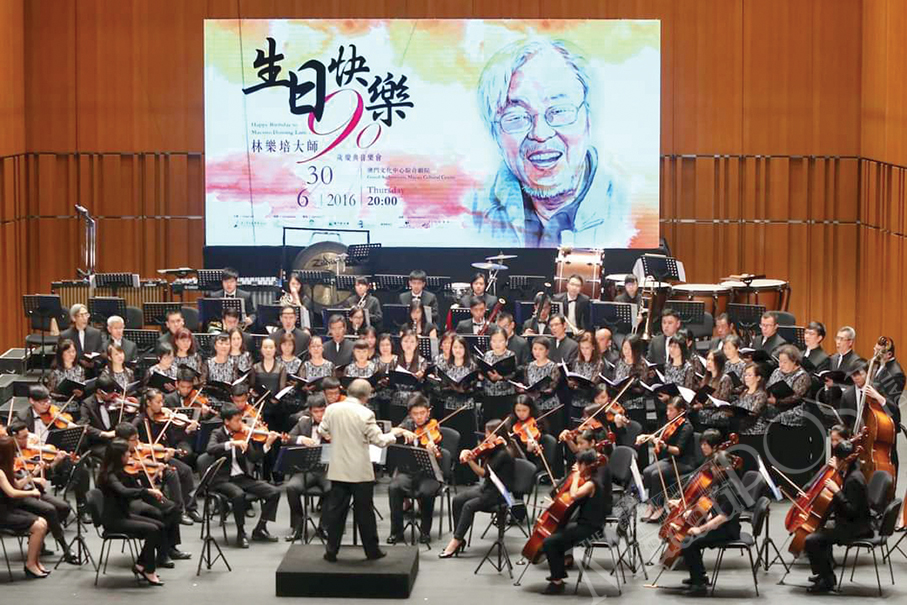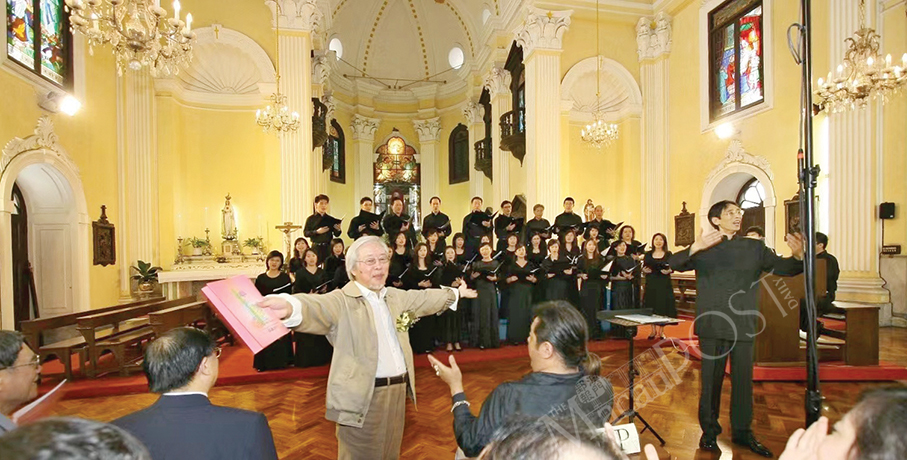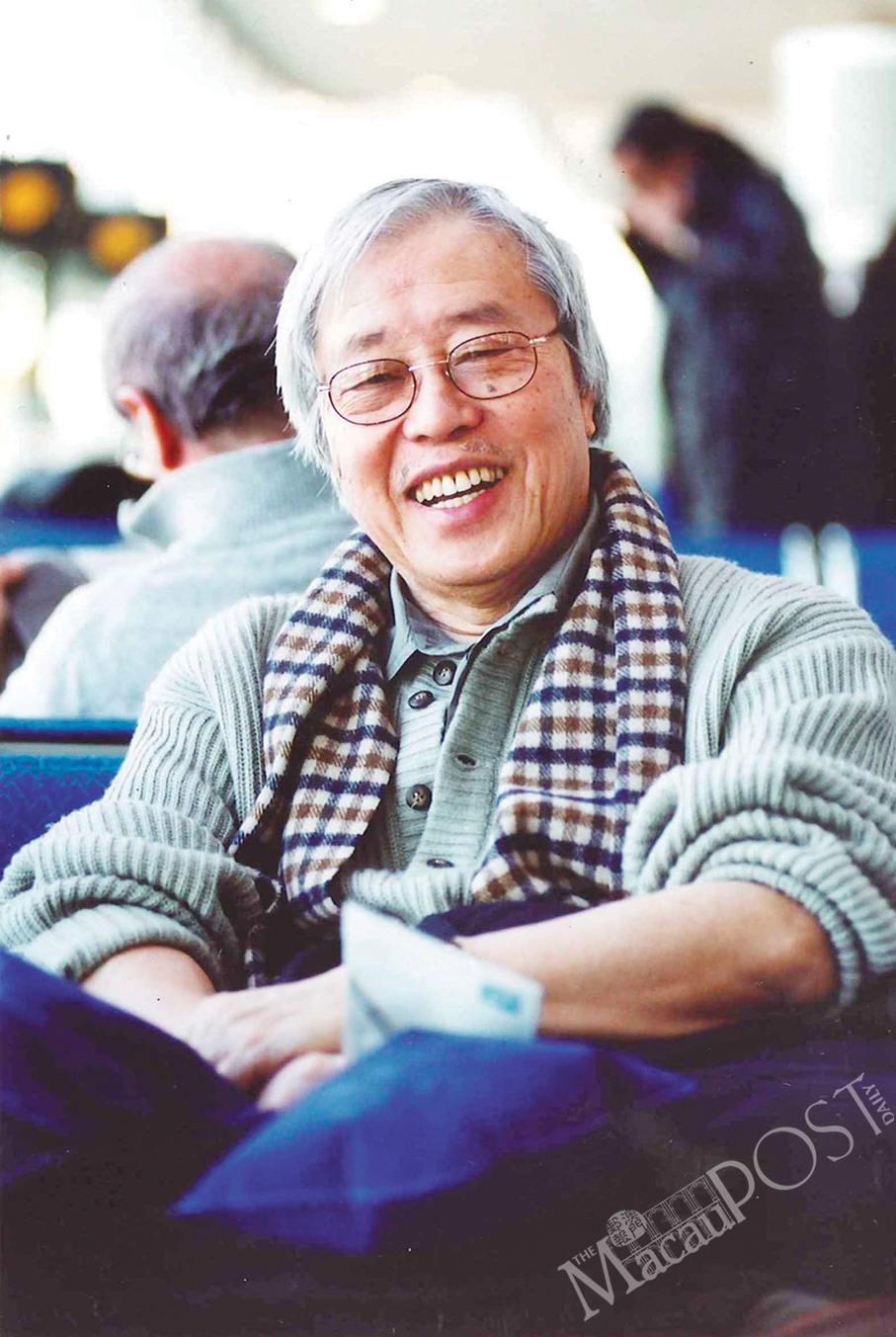Interview by William Chan
Prolific Macau-born composer Doming Lam passed away on January 11. He was 96.
One of the first of a few Chinese music composers who have appeared in the classical music encyclopaedia “Grove Dictionary of Music and Musicians”, Lam was named one of the five Asian composing masters by music circles in Tokyo in 1999 and had contributed to numerous entities such as the Sino-British Orchestra, Hong Kong’s now defunct Rediffusion, Hong Kong public broadcaster RTHK, the Asian Composers League (ACL), and the Macau Chamber Orchestra.
The Macau Post Daily recently interviewed Coro Perosi conductor João Ng Seng Hong and Jimson Hoi Kin Wa, president of the Macau Youth Symphony Orchestra (MYSO), about Lam’s music and contribution to Macau’s music society.
‘Search for roots in tradition, find ways in avant-garde’
Ng praised Lam’s mastery of fusing Chinese and Western music in Catholic choral pieces. “This task is arduous, especially for Cantonese with multiple phonetic tones. For example, ‘ngo mun’, (我們), which means “we” in Cantonese, has a descending perfect fourth tonal relationship, and it is impossible to understand the phrase if the tone is pronounced incorrectly. Lam was the first composer to take great care of the subtle relationship between the Cantonese lyrics and the melodies of his choral pieces,” Ng pointed out.
Ng noted that Lam’s creativity was based on his profound musical understanding. “If one does not have a strong foundation before they start to compose, they are destined to follow and copy others mindlessly. Lam’s music displays his overwhelming knowledge of music, which gave him all the tools he needed for innovation and creativity,” Ng noted.
Besides Lam’s musical foundation, Ng underlined that Lam had exceptional thoughts on sound conception, which led him to fuse Western and Chinese elements into his compositions with significant effect. Ng compared Lam to an eminent chef as an analogy. “Lam first conceived the taste of his dish, then he added and balanced the ingredients and seasonings with care and style. Thus, Lam’s music is not merely a mixture of salt and sugar: simply adding Chinese elements into Western choral pieces. Instead, the result of his creative endeavours was a phenomenal work with depth, coherence and innovation.”
During the interview, Ng cited one of Lam’s mottos – ‘Search for roots in tradition, find ways in the avant-garde’. “Most people considered the ‘tradition’ referred to by Lam as the Chinese tradition, but I think the ‘tradition’ should be plural,” Ng said, adding that many people are oblivious to Lam’s origin as a Catholic from Macau.
According to Ng, Lam was a St. Joseph’s Seminary and Church student when he was young, and this early music experience, especially as a choir member for Mass, became one of the traditional roots in Lam’s music. “Missa Laudis was one of the masterpieces Lam composed and wrote in Latin. When I first saw the score of Lam’s Missa Laudis in 2005, I was genuinely shocked: not only was this massive project profound and spectacular, but it was also because Lam had already created most of Missa Laudis in the early 60s!”
Missa Laudis is Latin for Mass of Praise.
“Indeed, Lam is often seen as a farsighted and imaginative artist by many. Nonetheless, he is a giant figure in the history of Macau music: his early music showed that Macau is not a cultural desert - far from it. We are one of the few places in Asia with a deep-rooted music history from the Catholic Church. I think that Lam, as one of the beneficiaries of the church, would treasure this tradition very much,” Ng said, adding that the city should also cherish this heritage seemingly lost in recent decades.
Paramount influence on local music
Meanwhile, MYSO President Hoi noted that Lam’s influence on music circles in Macau is unparalleled. “Lam had served in the 1980s as the music director of the Macao Chamber Orchestra, named Macao Orchestra (OM) today, during which he fundamentally changed the orchestra by first introducing new orchestral repertoires to the musicians which were largely unheard of before his arrival,” Hoi said, adding that Lam was also responsible for setting up orchestral seasons in hope of gradually boosting the orchestra’s music level.
According to Hoi, Macau in the 80s had a dearth of musicians, and Lam invited Hong Kong Academy for Performing Arts (APA) students to be guest musicians to participate in the weekly rehearsals in Macau. “Despite all the inconveniences, Lam never missed a single rehearsal session with the Macao Chamber Orchestra. The semi-professional young musicians invited to Macau, who later became the founding members of the Hong Kong Sinfonietta, were also very beneficial to the orchestra’s development,” Hoi said.
“…The Academy also deeply appreciates Dr Lam’s phenomenal contributions to modernising Chinese music. He was an inspiration to generations of young composers and musicians in Hong Kong and the region…” – Prof. Gillian Choa, Director of APA.
Hoi underlined that some local chamber orchestra musicians also contributed significantly to the music environment in Macau. “The MYSO, the Macau Band Directors Association (MBDA) and the Macau Philharmonic Association (MPA) were all founded by musicians that performed under Lam’s baton. In fact, I can say that all the local music organisations can trace their history back to Lam’s contribution,” Hoi said.
Hoi also noted that Lam’s music was especially influential in the Hong Kong Chinese Orchestra (HKCO) development where he became the spotlight. “The HKCO, one of the most prominent Chinese orchestras in the world, takes great pride in playing Lam’s avant-garde compositions. He was also active at Radio Television Hong Kong where he produced music programmes and composed for the channel,” Hoi added.
“…Master of contemporary music Doming Lam will forever be celebrated as a leading figure in Hong Kong’s cultural development, and an outstanding contributor to television and radio.” – Eddie Cheung, Director of RTHK.
“…The HKCO will uphold the spirit of innovation of Maestro Lam who was committed to promoting the development of Chinese music and opening up new horizons for the world of Chinese music… Lam engraved his irreplaceable imprint on the history of modern Chinese music development.” – Yan Huichang, Artistic Director and Principal Conductor for Life of the HKCO.
According to Hoi, when asked where he’s from, Lam always identified himself as a “Macau boy” [澳門仔] – even though his major achievements were outside Macau – Lam was attentive to local music development and always showed his love and concern for Macau. “However, Lam’s passion was not appreciated: the Macao Orchestra and the government seldom paid attention to Lam’s music, and when Lam retired and decided to donate his hand-written manuscripts to the Macau Central Library, his generous offer was refused,” Hoi said, adding that the manuscripts were instead given to Hong Kong University (HKU).
“…HKU’s Music Library was honoured to receive a generous donation of his 30-plus manuscripts. These first-hand materials offer a glimpse of the bounty of Dr Lam’s lifelong pursuit and breakthroughs in modernising Chinese music. Such a representative collection for sure will be an inspiration to many generations.” – Department of Music, The University of Hong Kong
P.S. All quotes in italics are from a booklet published recently about Doming Lam

This undated photo shows Jimson Hoi Kin Wa (left), president of the Macau Youth Symphony Orchestra (MYSO), shaking hands with Doming Lam at the Macau Cultural Centre (CCM). – Photos provided by MYSO

The Macau Youth Symphony Orchestra (MYSO) and Coro Perosi perform together during the “Happy Birthday to Maestro Doming Lam” concert in June 2016 at the Macau Cultural Centre’s Grand Auditorium.

Coro Perosi conductor João Ng Seng Hong (front right) and Doming Lam (front left) pose after the choir’s performance at St. Lawrence’s Church in 2006. – Photo provided by Coro Perosi

This undated photo shows composer Doming Lam. – Photo provided by Hong Kong Chinese Orchestra (HKCO)






